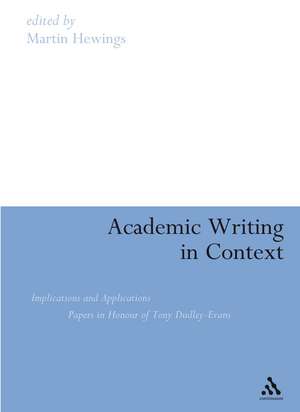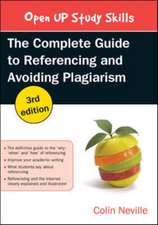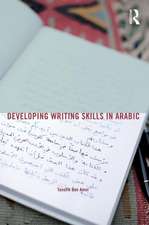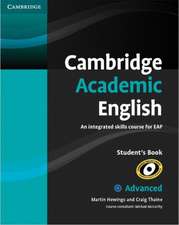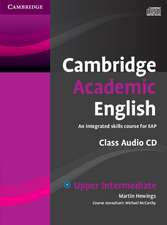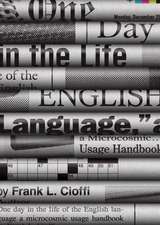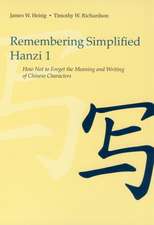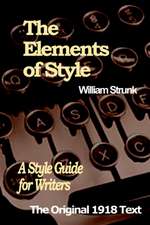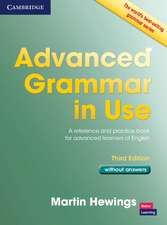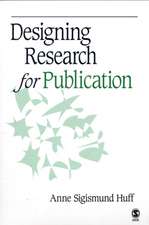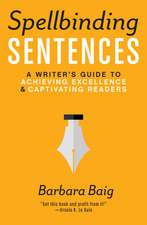Academic Writing in Context: Implications and Applications
Editat de Martin Hewingsen Limba Engleză Paperback – 20 iun 2006
Preț: 595.82 lei
Preț vechi: 692.81 lei
-14% Nou
Puncte Express: 894
Preț estimativ în valută:
114.01€ • 119.34$ • 94.89£
114.01€ • 119.34$ • 94.89£
Carte tipărită la comandă
Livrare economică 31 martie-14 aprilie
Preluare comenzi: 021 569.72.76
Specificații
ISBN-13: 9780826481313
ISBN-10: 0826481310
Pagini: 256
Dimensiuni: 155 x 229 x 19 mm
Greutate: 0.38 kg
Editura: Bloomsbury Publishing
Colecția Continuum
Locul publicării:London, United Kingdom
ISBN-10: 0826481310
Pagini: 256
Dimensiuni: 155 x 229 x 19 mm
Greutate: 0.38 kg
Editura: Bloomsbury Publishing
Colecția Continuum
Locul publicării:London, United Kingdom
Caracteristici
Contributors include some of the biggest names in applied linguistics e.g. Martin Hewings, Ann Hewings, Vijay Bhatia, Charles Bazerman, John Swales.
Cuprins
Contributors
Acknowledgements
1. Introduction; Marting Hewings
2. Publications by Tony Dudley-Evans
3. Distanced and refined selves: educational tensions in writing with the power of knowledge; Charles Bazerman
4. The future is with us: preparing diverse students for the challenges of university texts and cultures; Ann M. Johns
5. Descriptions or explanations? Some methodological issues in Contrastive Rhetoric; Anna Mauranen
6. From evidence to conclusion: the case of 'indicate that'; Tim Johns
7. 'In my opinion': the place of personal views in undergraduate essays; Greg Myers
8. Analysing genre: some conceptual issues; Vijay K. Bhatia 9. Abstracting from abstracts; Thomas Huckin
10. Short answers in first-year science writing. What kind of genres are they?; Helen Drury
11. Introductory textbooks and disiplinary acculturation: a case study from social anthropology; Alison Love
12. Cyberdiscourse, evolving notions of authorship, and the teaching of writing; Diane Belcher
13. Exemplification strategy in Adam Smith's 'Wealth of Nations'; Willie Henderson
14. Active verbs with inanimate subjects in scientific research articles; Peter Master
15. There'll be some changes made: predicting future events in academic and business genres; Meriel Bloor and Thomas Bloor
16. Anticipatory 'it' in academic writing: an indicator of disciplinary difference and developing disciplinary knowledge; Ann Hewings and Michael Hewings
17. Reflections on collaborative practice in EAP materials production; John M. Searle and Christine B. Feak References
Index
Acknowledgements
1. Introduction; Marting Hewings
2. Publications by Tony Dudley-Evans
3. Distanced and refined selves: educational tensions in writing with the power of knowledge; Charles Bazerman
4. The future is with us: preparing diverse students for the challenges of university texts and cultures; Ann M. Johns
5. Descriptions or explanations? Some methodological issues in Contrastive Rhetoric; Anna Mauranen
6. From evidence to conclusion: the case of 'indicate that'; Tim Johns
7. 'In my opinion': the place of personal views in undergraduate essays; Greg Myers
8. Analysing genre: some conceptual issues; Vijay K. Bhatia 9. Abstracting from abstracts; Thomas Huckin
10. Short answers in first-year science writing. What kind of genres are they?; Helen Drury
11. Introductory textbooks and disiplinary acculturation: a case study from social anthropology; Alison Love
12. Cyberdiscourse, evolving notions of authorship, and the teaching of writing; Diane Belcher
13. Exemplification strategy in Adam Smith's 'Wealth of Nations'; Willie Henderson
14. Active verbs with inanimate subjects in scientific research articles; Peter Master
15. There'll be some changes made: predicting future events in academic and business genres; Meriel Bloor and Thomas Bloor
16. Anticipatory 'it' in academic writing: an indicator of disciplinary difference and developing disciplinary knowledge; Ann Hewings and Michael Hewings
17. Reflections on collaborative practice in EAP materials production; John M. Searle and Christine B. Feak References
Index
